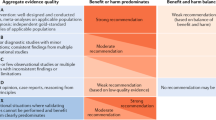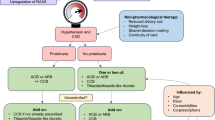Abstract
BCR-ABL1 tyrosine kinase inhibitors (TKIs) have dramatically improved survival outcomes in patients with chronic phase chronic myeloid leukemia (CML-CP) and are associated with a manageable safety profile. However, long-term TKI administration can lead to cardiovascular or renal adverse events. One goal in discontinuation of TKIs was reduction of adverse events, but it is unclear whether chronic toxicities are ameliorated as a result. In this study, we evaluated changes in estimated glomerular filtration rate (eGFR) in patients with CML-CP before and after TKI discontinuation. Long-term TKI treatment appears to induce renal toxicity, as eGFR at the time of TKI discontinuation correlated with the duration of TKI treatment (r = − 0.478, p = 0.005). Patients who received imatinib as first-line treatment exhibited lower eGFR levels than those treated with dasatinib or nilotinib, which may be correlated with long-term treatment (p = 0.027). After TKI discontinuation, no significant increases in eGFR were seen either in patients with treatment-free remission (66.8–71.2 ml/min/1.73 m2) or molecular relapse (64.8–68.7 ml/min/1.73 m2, p = 0.666). These data indicate that TKI-induced renal toxicities are associated with long-term TKI treatment, and may be irreversible even following treatment discontinuation.

Similar content being viewed by others
References
Ureshino H, Shindo T, Kimura S. Role of cancer immunology in chronic myelogenous leukemia. Leuk Res. 2020;88:106273.
Kimura S. Current status of ABL tyrosine kinase inhibitors stop studies for chronic myeloid leukemia. Stem Cell Investig. 2016;3:36–36.
Mahon F-X, Réa D, Guilhot J, Guilhot F, Huguet F, Nicolini F, et al. Discontinuation of imatinib in patients with chronic myeloid leukaemia who have maintained complete molecular remission for at least 2 years: the prospective, multicentre Stop Imatinib (STIM) trial. Lancet Oncol. 2010;11:1029–35.
Imagawa J, Tanaka H, Okada M, Nakamae H, Hino M, Murai K, et al. Discontinuation of dasatinib in patients with chronic myeloid leukaemia who have maintained deep molecular response for longer than 1 year (DADI trial): a multicentre phase 2 trial. Lancet Haematol. 2015;2:e528–e535535.
Hochhaus A, Masszi T, Giles FJ, Radich JP, Ross DM, Gómez Casares MT, et al. Treatment-free remission following frontline nilotinib in patients with chronic myeloid leukemia in chronic phase: Results from the ENESTfreedom study. Leukemia. 2017;31:1525–31.
Mahon F-X, Boquimpani C, Kim D-W, Benyamini N, Clementino NCD, Shuvaev V, et al. Treatment-free remission after second-line nilotinib treatment in patients with chronic myeloid leukemia in chronic phase: results from a single-group, phase 2, Open-Label Study. Ann Intern Med. 2018;168:461–70.
Fujisawa S, Ueda Y, Usuki K, Kobayashi H, Kondo E, Doki N, et al. Feasibility of the imatinib stop study in the Japanese clinical setting: delightedly overcome CML expert stop TKI trial (DOMEST Trial). Int J Clin Oncol. 2019;24:445–53.
Saussele S, Richter J, Guilhot J, Gruber FX, Hjorth-Hansen H, Almeida A, et al. Discontinuation of tyrosine kinase inhibitor therapy in chronic myeloid leukaemia (EURO-SKI): a prespecified interim analysis of a prospective, multicentre, non-randomised, trial. Lancet Oncol. 2018;19:747–57.
Rea D, Nicolini FE, Tulliez M, Guilhot F, Guilhot J, Guerci-Bresler A, et al. Discontinuation of dasatinib or nilotinib in chronic myeloid leukemia: interim analysis of the STOP 2G-TKI study. Blood. 2017;129:846–54.
Takahashi N, Tauchi T, Kitamura K, Miyamura K, Saburi Y, Hatta Y, et al. Deeper molecular response is a predictive factor for treatment-free remission after imatinib discontinuation in patients with chronic phase chronic myeloid leukemia: the JALSG-STIM213 study. Int J Hematol. 2018;107:185–93.
Steegmann JL, Baccarani M, Breccia M, Casado LF, García-Gutiérrez V, Hochhaus A, et al. European LeukemiaNet recommendations for the management and avoidance of adverse events of treatment in chronic myeloid leukaemia. Leukemia. 2016;30:1648–71.
Kanda Y. Investigation of the freely available easy-to-use software “EZR” for medical statistics. Bone Marrow Transpl. 2013;48:452–8.
Okada M, Imagawa J, Tanaka H, Nakamae H, Hino M, Murai K, et al. Final 3-year results of the dasatinib discontinuation trial in patients with chronic myeloid leukemia who received dasatinib as a second-line treatment. Clin Lymphoma Myeloma Leuk. 2018;18(353–360):e1.
Breccia M, Molica M, Colafigli G, Massaro F, Quattrocchi L, Latagliata R, et al. Prognostic factors associated with a stable MR4.5 achievement in chronic myeloid leukemia patients treated with imatinib. Oncotarget. 2018;9:7534–40.
Branford S, Yeung DT, Ross DM, Prime JA, Field CR, Altamura HK, et al. Early molecular response and female sex strongly predict stable undetectable BCR-ABL1, the criteria for imatinib discontinuation in patients with CML. Blood. 2013;121:3818–24.
Ureshino H, Shindo T, Kojima H, Kusunoki Y, Miyazaki Y, Tanaka H, et al. Allelic polymorphisms of KIR s and HLA s predict favorable responses to tyrosine kinase inhibitors in CML. Cancer Immunol Res. 2018;6:745–54.
Yilmaz M, Lahoti A, O’Brien S, Nogueras-González GM, Burger J, Ferrajoli A, et al. Estimated glomerular filtration rate changes in patients with chronic myeloid leukemia treated with tyrosine kinase inhibitors. Cancer. 2015;121:3894–904.
Marcolino MS, Boersma E, Clementino NCD, Macedo AV, Marx-Neto AD, Silva MHCR, et al. Imatinib treatment duration is related to decreased estimated glomerular filtration rate in chronic myeloid leukemia patients. Ann Oncol. 2011;22:2073–9.
Ren X, Qin Y, Huang X, Zuo L, Jiang Q. Assessment of chronic renal injury in patients with chronic myeloid leukemia in the chronic phase receiving tyrosine kinase inhibitors. Ann Hematol. 2019;98:1627–40.
Sakurai M, Kikuchi T, Karigane D, Kasahara H, Matsuki E, Hashida R, et al. Renal dysfunction and anemia associated with long-term imatinib treatment in patients with chronic myelogenous leukemia. Int J Hematol. 2019;109:292–8.
Imai E, Horio M, Yamagata K, Iseki K, Hara S, Ura N, et al. Slower decline of glomerular filtration rate in the Japanese general population: a longitudinal 10-year follow-up study. Hypertens Res. 2008;31:433–41.
Baba M, Shimbo T, Horio M, Ando M, Yasuda Y, Komatsu Y, et al. Longitudinal study of the decline in renal function in healthy subjects. PLoS ONE. 2015;10:e0129036.
Malkan UY, Haznedaroglu IC. Discontinuation of imatinib mesylate could improve renal impairment in chronic myeloid leukemia. Open Med. 2019;14:22–4.
Kizaki M, Takahashi N, Iriyama N, Okamoto S, Ono T, Usui N, et al. Efficacy and safety of tyrosine kinase inhibitors for newly diagnosed chronic-phase chronic myeloid leukemia over a 5-year period: results from the Japanese registry obtained by the New TARGET system. Int J Hematol. 2019;109:426–39.
Hochhaus A, Saglio G, Hughes TP, Larson RA, Kim DW, Issaragrisil S, et al. Long-term benefits and risks of frontline nilotinib vs imatinib for chronic myeloid leukemia in chronic phase: 5-year update of the randomized ENESTnd trial. Leukemia. 2016;30:1044–54.
Cortes JE, Saglio G, Kantarjian HM, Baccarani M, Mayer J, Boqué C, et al. Final 5-year study results of DASISION: The dasatinib versus imatinib study in treatment-Naïve chronic myeloid leukemia patients trial. J Clin Oncol. 2016;34:2333–400.
Kimura S, Imagawa J, Murai K, Hino M, Kitawaki T, Okada M, et al. Treatment-free remission after first-line dasatinib discontinuation in patients with chronic myeloid leukaemia (first-line DADI trial): a single-arm, multicentre, phase 2 trial. Lancet Haematol. 2020;7:e218–e225225.
Acknowledgements
None.
Funding
This work was supported by research grants from JSPS KAKENHI (19K17860, HU) and JSPS KAKENHI (17K09908, SK).
Author information
Authors and Affiliations
Corresponding author
Ethics declarations
Conflict of interest
SK has received honoraria from Bristol-Myers Squibb, Novartis, Pfizer, and Otsuka Pharmaceuticals, and research funding from Bristol-Myers Squibb, Novartis, Pfizer, Otsuka Pharmaceuticals, and Ohara Pharmaceuticals. The other authors declare no potential conflicts of interest.
Ethical approval
This study was approved by the Institutional Review Board of Saga University. All procedures involving human participants were performed in accordance with the ethical standards of institutional and/or national research committees, and the Declaration of Helsinki.
Informed consent
Informed consent was waived because of the retrospective design of the data collection. Information of the research, including the aims of use of specimens and the opportunity to opt out from the research, was made public. No patients objected to this study.
Additional information
Publisher's Note
Springer Nature remains neutral with regard to jurisdictional claims in published maps and institutional affiliations.
About this article
Cite this article
Okamoto, S., Ureshino, H., Kawaguchi, A. et al. Assessment of estimated glomerular filtration rate in patients with chronic myeloid leukemia following discontinuation of tyrosine kinase inhibitors. Int J Hematol 112, 41–45 (2020). https://doi.org/10.1007/s12185-020-02880-3
Received:
Revised:
Accepted:
Published:
Issue Date:
DOI: https://doi.org/10.1007/s12185-020-02880-3




